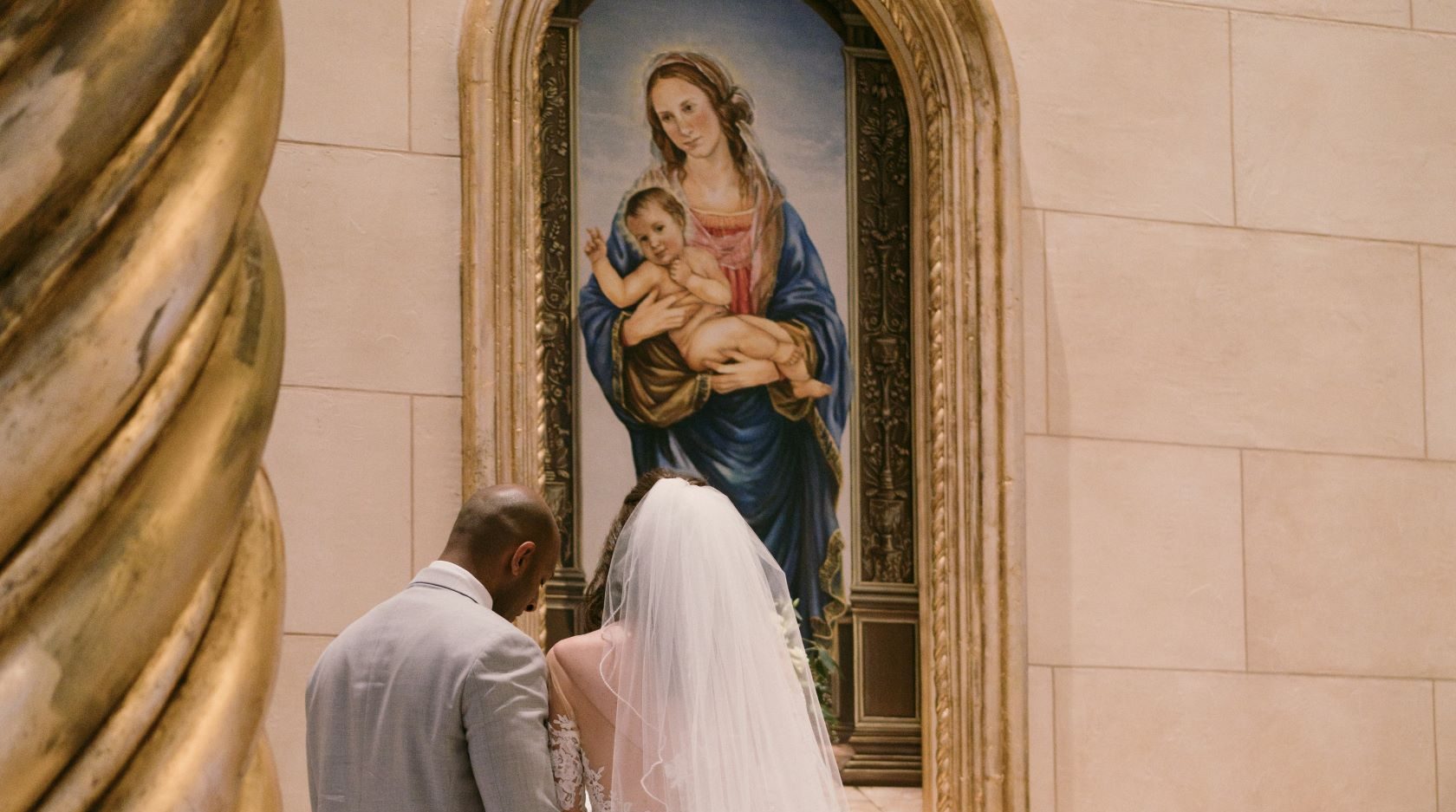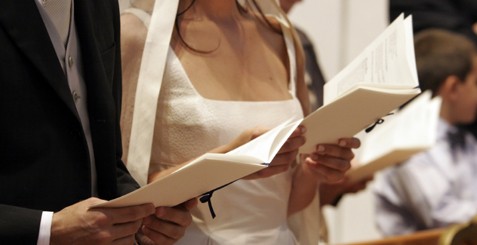Prayer is the glue that holds a marriage and a family together. Prayer comes in many forms, including recited prayers, such as the Hail Mary; spontaneous prayer, as a husband and wife might say before bedtime; praying with Scripture; and that perfect prayer–the Mass.
The book, Catholic Household Blessings and Prayers, is an excellent resource for your marriage as you explore the Catholic tradition of prayer. Here are some excerpts:
Blessing of an Engaged Couple
The betrothal of a Christian couple is a special occasion for their families, who should celebrate it together with prayer and a special rite. In this way, they ask God’s blessing that the happiness promised by the engagement will be brought to fulfillment. When the engagement is celebrated within the circle of the two families, one of the parents should preside.
When the families have gathered, all make the sign of the cross.
The leader greets those present in the following words:
Brothers and sisters, let us praise our Lord Jesus Christ, who loved us and gave himself for us. Let us bless him now and forever.
R/. Blessed be God forever.
In the following or similar words, the leader prepares those present for the blessing.
We know that all of us need God’s blessing at all times; but at the time of their engagement to be married, Christians are in particular need of grace as they prepare themselves to form a new family.
Let us pray, then, for God’s blessing to come upon this couple: that as they await the day of their wedding, they will grow in mutual respect and in their love for one another; that through their companionship and prayer together they will prepare themselves rightly and chastely for marriage.
One of those present or the leader reads a text of sacred Scripture.
Listen to the words of the First Letter of St. Paul to the Corinthians: 13:4-13
Love is patient, love is kind. It is not jealous, love is not pompous, it is not inflated, it is not rude, it does not seek its own interests, it is not quick-tempered, it does not brood over injury, it does not rejoice over wrongdoing but rejoices with the truth. It bears all things, believes all things, hopes all things, endures all things.
Love never fails. If there are prophecies, they will be brought to nothing; if tongues, they will cease; if knowledge, it will be brought to nothing. For we know partially and we prophesy partially, but when the perfect comes, the partial will pass away. When I was a child, I used to talk as a child, think as a child, reason as a child; when I became a man, I put aside childish things. At present we see indistinctly, as in a mirror, but then face to face. At present I know partially; then I shall know fully, as I am fully known. So faith, hope, love remain, these three; but the greatest of these is love.
Or John 15:9-12: This is my commandment: love one another as I have loved you.
Reader: The Word of the Lord.
R/. Thanks be to God.
The intercessions are then said.
Leader: God our Father has so loved us that in Christ he makes us his children and the witnesses of his love before the entire world. Let us, therefore, call upon him in all confidence, saying:
R/. Lord, help us to remain always in your love.
God our Father, you willed that your true children, brothers and sisters in Christ, should be known by their love for one another. R/.
You place upon us the sweet demands of love so that we may find happiness by responding to them. R/.
You call N. and N. to the communion of life and love that binds the Christian family together, mind and heart. R/.
The engaged couple may exchange rings or some other gift that signifies their pledge to each other.
One of the parents may bless these gifts:
N. and N., in due course may you honor the sacred pledge symbolized by these gifts which you now exchange.
R/. Amen.
The leader says the prayer of blessing with hands joined.
We praise you, Lord, for your gentle plan draws together your children, N. and N., in love for one another. Strengthen their hearts, so that they will keep faith with each other, please you in all things, and so come to the happiness of celebrating the sacrament of their marriage. We ask this through Christ our Lord.
R/. Amen.
The leader concludes the rite by signing himself or herself with the sign of the cross and saying:
May the God of love and peace abide in you, guide your steps, and confirm your hearts in his love, now and forever.
R/. Amen.
The blessing may conclude with a suitable song.
Prayer of a Future Husband
Adapted from Tobit 8:5-7
Blessed are you, O God of our ancestors, and blessed too is your name forever. Let the heavens bless you forevermore and all the things you have made. It was you who created Adam, you who created Eve his wife to be his help and support; and from these two the human race was born. It was you who said, “It is not good for the man to be alone; let us make him a partner like himself.”
I take N. in sincerity of heart. Have mercy on her and on me and allow us to live together to a happy old age.
Prayer of a Future Wife
Adapted from Psalm 16
Keep me, O God, for in you I take refuge; I say to the Lord, “My God are you. Apart from you, I have no good.” I bless the Lord who counsels me; even in the night, my heart exhorts me. I set the Lord ever before me; with him at my right hand, I shall not be disturbed. Therefore my heart is glad and my soul rejoices, my body abides in confidence.
You, O Lord, will show me the path to life, the fullness of joys in your presence, the delights at your right hand forever.
Blessing of a Son or Daughter Before Marriage
In the days immediately before the wedding, the family may gather around its member who is to be married, perhaps at a special meal in the family’s home.
All make the sign of the cross. A parent begins:
Let us bless the Lord, by whose goodness we live and by whose grace we love one another. Blessed be God forever.
R/. Blessed be God forever.
Then the Scripture is read:
Listen to the words of the Book of Deuteronomy: 6:4-7
Hear, O Israel! The Lord is our God, the Lord alone! Therefore, you shall love the Lord, your God, with all your heart, and with all your soul, and with all your strength. Take to heart these words which I enjoin on you today. Drill them into your children. Speak of them at home and abroad, whether you are busy or at rest.
Reader: The Word of the Lord.
R/. Thanks be to God.
The parents may give a Bible or crucifix to the one who is to be married. Then all join in prayers of intercession for the couple to be married and for the world. After the Lord’s Prayer, the parents and other family members place their hands on the head of their son or daughter as one or both parents speak the blessing.
May the Lord, who gave you into our care and made you a joy to our home, bless you and keep you.
R/. Amen.
May the Lord, who turns the hearts of parents to their children and the hearts of children to their parents, smile on you and be kind to you.
R/. Amen.
May the Lord, who delights in our love for one another, turn toward you and give you peace.
R/. Amen.
All make the sign of the cross as the leader concludes:
May the God of love and peace abide in you, guide your steps, and confirm your heart in his love, now and forever.
R/. Amen.
Table Blessing for Weddings
This blessing may be used before the meal at a wedding reception. A member of the wedding party or one of the parents of the newly married couple may serve as the leader.
When everyone has gathered at the table and the meal is ready to be served, all make the sign of the cross.
Leader: Blessed be God who has brought us together in joy.
R/. Blessed be God forever.
The leader introduces the blessing in these or similar words:
We have gathered here to celebrate the love of N. and N. God has brought them together, and we pray that God will hold them in his love always. As the food we share will strengthen our bodies, may our time together strengthen the love that binds us.
After a time of silence, the leader prays:
Let us pray. Lord God, you sustain all creatures and never cease to give your children the food they need. We bless you for bringing us together in the love that unites us around this table where the food we take strengthens our bodies. We pray that, nourished by your Word, we may grow ever stronger in faith as we strive for the coming of your Kingdom. We ask this through Christ our Lord.
R/. Amen.
Blessing on Anniversaries #1
When the household and friends have gathered, all make the sign of the cross.
The leader greets those present in the following words:
Blessed be the God of all consolation, who has shown us his great mercy. Blessed be God now and forever.
R/. Blessed be God forever.
In the following or similar words, the leader prepares those present for the blessing.
We have come together to celebrate the anniversary of the marriage of our brother and sister. As we join them in their joy, we join them also in their gratitude. God has set them among us as a sign of his love and through the years they have remained faithful (and have fulfilled their responsibilities as parents). Let us give thanks for all the favors N. and N. have received during their married life. May God keep them in their love for each other, so that they may be more and more of one mind and one heart.
One of those present or the leader reads a text of sacred Scripture.
Listen to the words of the First Letter of St. Paul to the Corinthians 1:4-9
I give thanks to my God always on your account for the grace of God bestowed on you in Christ Jesus, that in him you were enriched in every way, with all discourse and all knowledge, as the testimony to Christ was confirmed among you so that you are not lacking in any spiritual gift as you wait for the revelation of our Lord Jesus Christ. He will keep you firm to the end, irreproachable on the day of our Lord Jesus Christ. God is faithful, and by him, you were called to fellowship with his Son, Jesus Christ our Lord.
Reader: The Word of the Lord.
R/. Thanks be to God.
The intercessions are then said.
Leader: In the tender plan of his providence, God our almighty Father has given married love, its faithfulness, (and its fruitfulness,) a special significance in the history of salvation. Let us, therefore, call upon him, saying:
R/. Lord, hear our prayer.
Father all-holy, you have made marriage the great symbol of Christ’s love for his Church; bestow on these your servants the fullness of your own love. For this, we pray: R/.
Father all-holy, the faithful one, you ask for and respond to fidelity to your covenant; fill with your blessings your servants who are celebrating their wedding anniversary. For this, we pray: R/.
It is your will that all married life should be a lesson in Christian living; grant that all husbands and wives may be witnesses to the wonders of your Son’s love. For this, we pray: R/.
The leader says the prayer of blessing with hands joined.
Lord God and Creator, we bless and praise your name. In the beginning, you made man and woman, so that they might enter a communion of life and love. You likewise blessed the union of N. and N., so that they might reflect the union of Christ with his Church: look with kindness on them today. Amid the joys and struggles of their life you have preserved the union between them; renew their marriage covenant, increase your love in them, and strengthen their bond of peace, so that (surrounded by their children) they may always rejoice in the gift of your blessing. We ask this through Christ our Lord.
R/. Amen.
Blessing on Anniversaries #2
Almighty and eternal God, you have so exalted the unbreakable bond of marriage that it has become the sacramental sign of your Son’s union with the Church as his spouse. Look with favor on N. and N., whom you have united in marriage, as they ask for your help and the protection of the Virgin Mary. They pray that in good times and in bad they will grow in love for each other; that they will resolve to be of one heart in the bond of peace.
Lord, in their struggles, let them rejoice that you are near to help them; in their needs let them know that you are there to rescue them; in their joys let them see that you are the source and completion of every happiness. We ask this through Christ our Lord.
R/. Amen.
The leader concludes the rite by signing himself or herself with the sign of the cross and saying:
May the God of hope fill us with every joy in believing. May the peace of Christ abound in our hearts. May the Holy Spirit enrich us with his gifts, Now and forever.
R/. Amen.
Excerpts from Blessings and Prayers for Home and Family (c) Concacan, Inc, 2004. Used and adapted by permission of the Canadian Conference of Catholic Bishops.
Excerpts from the English translations of Book of Blessings (c) 1988, International Committee on English in the Liturgy, Inc. (ICEL). All rights reserved.
Bring prayer into your marriage! Use Catholic Household Blessings and Prayers to:
- Learn the “by-hearts”-the prayers that every Catholic needs to know by memory
- Practice the simple form of the Liturgy of the Hours as a family
- Celebrate the feasts and seasons of the Church year in ritual and prayer
- Bless the Advent wreath, Christmas crèche, and Easter foods
- Lead grace before and after meals
- Pray for family members
- Bless the home before a move and in times of trouble
Additional Resources:









